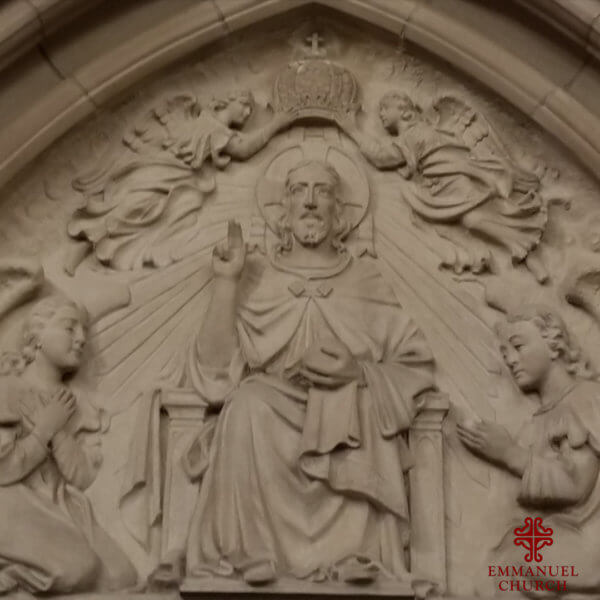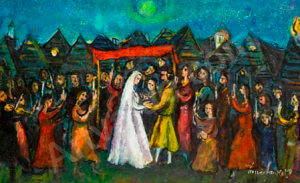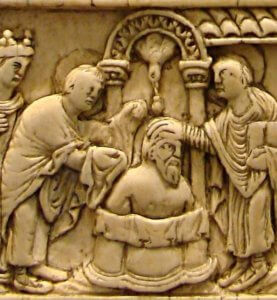
Wear Your Wedding Robe!
Gracious God, you make for all peoples a feast of rich food, a feast of well-aged wines, of rich food filled with marrow, of well-aged wines strained clear. [Isaiah 25:6] You spread a table before me, and my cup is running over. [Ps. 23:5]
Grant that we may wear gladly the robe of our baptism to celebrate your great abundance. Amen
Just as the weather begins to cool, and we’re beginning to bundle up against the morning chill, our gospel this week is all about the right clothes for the right occasion. We’re reading the parable of the wedding guests from Matthew. That’s the one where which garment a last-minute guest chose to wear to the king’s son’s wedding feast was a very big deal. Not showing up in the right clothes for the occasion had grave consequences. But this is a parable. Things are much more — and different — than they seem at first glance. Jesus is telling us what the kingdom of heaven is like, so we know that he is talking about more than just any wedding — even a royal wedding.
The invitation list has been carefully planned, and smoothed with a fine-tooth comb. How many people will fit in the hall? How much food can the the staff prepare for the traditional 3-day feast? Are fatted calves in plentiful supply? Is there enough wine?
And then, after all that part had been done, and planned, nobody showed up!! The king sent out his staff with personal reminders, but the invited guests still would not come. Can you smell the aroma of the beautiful roast beef, the colorful fresh fruit, and the fragrant flowers? SO much planning, work, and preparation, but the honored guests turn their noses up at the invitation.
Inconvenience Instead of an Honor
As Matthew’s Jesus tells it, they acted like invitation is an inconvenience instead of an honor. A couple of them had something else they’d rather do, while the rest of them responded with outright hostility, mistreating and even killing the people who came to remind them of the party. This is where it becomes clear that we are in that alternate parable reality. Now that we know that, we can go back to the story to understand what Jesus is telling us.
The king is, reasonably enough, FURIOUS! He sends his troops to destroy the invited guests who mistreated and killed his staff, and burns their city. Even though this wedding banquet has taken a decidedly odd — and serious — turn, the king regroups. He decides to sent out yet another staff team to invite people from the streets — anyone they see, both good and bad, as Matthew’s gospel tells us. And then there it is.
 The hall is full of guests, milling around. One of the people who was invited at the very last minute, after the banquet tables had been set and the feast prepared, is not wearing the right clothes. He doesn’t have on a wedding robe. So the king has him seized, tied up, and thrown into the outer darkness. Wait! That hardly seems fair for someone who was not on the original guest list. He didn’t have six weeks to plan his outfit for the wedding! This is where we have to step into the context of the parable.
The hall is full of guests, milling around. One of the people who was invited at the very last minute, after the banquet tables had been set and the feast prepared, is not wearing the right clothes. He doesn’t have on a wedding robe. So the king has him seized, tied up, and thrown into the outer darkness. Wait! That hardly seems fair for someone who was not on the original guest list. He didn’t have six weeks to plan his outfit for the wedding! This is where we have to step into the context of the parable.
First, Jesus is talking about what the kingdom of heaven is like, so we know that this wedding feast will be different from others. Second, if the kingdom of heaven is like a king who has a last-minute guest seized, tied up, and thrown into the outer darkness because he wore the wrong thing to the wedding feast, we can be pretty sure we need to lean in close and figure out why the kingdom of heaven would be like that.
Wedding Robe
It helps to learn that special garments would have been provided for the guests at Ancient Near East weddings — it was like a groom’s prize or a party favor handed out at the door. Remember that only one of all the last minute guests that the king’s third team of staff went into the streets to invite refused to wear a wedding robe. Everyone else put one on, but for some reason, this one person didn’t really accept the king’s invitation to the feast. He didn’t join in the celebration with his whole heart. He was just there to eat some fatted calf and drink some nice wine, but he didn’t really enter into the spirit of the party.
In that way, the guest who couldn’t be bothered to put on a wedding robe was like the first two invited guests who turned up their noses at the invitation when they got the reminder: one went to his farm, and the other to his office. Theologians have said that the wedding robe in the parable symbolizes obedience, or a test of loyalty to the king — and therefore to God. Late 19th century preacher Charles Haddin Spurgeon wrote about the meaning of the wedding garment:
So many answers have been given that I conclude that if our Saviour had intended any one specific thing he would have expressed himself more plainly, so that we would have been able, without so much theological disputing, to have understood what he meant.
 Sam Wells, public theologian and Vicar of St. Martin in the Fields in London, reminds us that in the early centuries of the church, when Christians heard the word robe — as in wedding robe — they would have thought of only one thing: the baptismal robe. Baptism meant not just a ceremony with words and water, but also a new social location and putting the rest of your life in jeopardy in order to enjoy — really celebrate — being at the wedding banquet. If you weren’t prepared to take steps to show that being at that banquet meant everything to you, it would be better not to go.
Sam Wells, public theologian and Vicar of St. Martin in the Fields in London, reminds us that in the early centuries of the church, when Christians heard the word robe — as in wedding robe — they would have thought of only one thing: the baptismal robe. Baptism meant not just a ceremony with words and water, but also a new social location and putting the rest of your life in jeopardy in order to enjoy — really celebrate — being at the wedding banquet. If you weren’t prepared to take steps to show that being at that banquet meant everything to you, it would be better not to go.
Many of us were likely baptized as infants in traditional baptismal gowns or other white clothing. Ancient Christians were baptized on Easter after many weeks studying scripture and Christian teaching. They plunged into the waters of the full-immersion font — or were soaked or drenched by pouring water — wearing the clothes they were born in. They were dressed in white robes when they emerged, symbolizing their new way of being in the world. They wore their baptismal robes for some time after their baptism to symbolize and celebrate their new way of being in community and living in the world.
Which Guest Are You?
So what do we put on in response to this huge invitation? What do we wear to the wedding feast? I don’t know about you, but I can see myself in ALL of the guests. I can get focused on my checklist and what’s right in front of me. I can see myself not really bringing my whole, best self to God when God calls. I can see myself ignoring the invitation, and then going to the office when I’m reminded about the wedding feast, like the one who went to his business.
What about the guest who went to his farm when the king’s staff came to find him? At his farm, he’s in control. He chooses all of his own tools, and maintains them and stores them just the way he wants. He takes his own crops to market and decides when, where, and how to cook and eat the crops. He doesn’t have to check in, or coordinate with anyone else in order to make decisions. I could be that one too.
What about the last-minute guest, who agrees to come, but isn’t in the mood to go all in with the wedding robe? Busted! That could be me too! Does it feel familiar to you? I’m a cradle Episcopalian, stuck in my ways. I grew up in a church — and went to a preschool — that looks and feels so much like Emmanuel that my tenderest memories and feelings can sometimes sneak up on me in this amazing space. So sometimes it’s hard for me to imagine a new way of doing things, like another nonprofit community partner sharing our space.
So what do we wear to the wedding feast? Dress for the season!! We are in a season of change — Fall, Ordinary time, and COVIDtide, political change, economic challenge, pledge season, and new ways of being church and learning how to support our lives in community, both financially and in leadership.
So let’s dress in layers, so we can be comfortable in a sharp breeze, or as the morning warms. Also, remember your mask. Most important, wear your baptismal robes. Put on your joy, wear your sense of possibility and curiosity about the new ways God is bringing us together, and don’t forget your sense of adventure.
In these changing times, wearing the right thing to God’s great feast is about being open to new ways of thinking, and MOST IMPORTANT, remembering to celebrate! Amen
